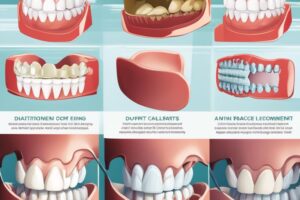Many individuals with dental implants may not be aware of the crucial oral care techniques necessary to maintain the health and longevity of their implants. Proper oral hygiene is imperative to prevent infections, complications, and implant failure. In this blog post, we will investigate into advanced oral care strategies specifically tailored to individuals with dental implants. By following these expert tips, you can ensure the success of your implant treatment and enjoy a healthy, beautiful smile for years to come.
Key Takeaways:
- Regular and Proper Oral Hygiene: Brushing at least twice a day and flossing daily is crucial to maintain oral health for individuals with dental implants.
- Special Cleaning Techniques: Using soft-bristled toothbrushes, non-abrasive toothpaste, interdental brushes, and antimicrobial mouthwash can help in cleaning around dental implants effectively.
- Regular Dental Check-ups: Routine dental visits are important to monitor the condition of dental implants, detect any issues early on, and ensure proper oral care techniques are being followed.
Daily Maintenance of Dental Implants
Proper Brushing Techniques
Some individuals may think that brushing dental implants is the same as brushing natural teeth, but there are special considerations to keep in mind. Any use of a soft-bristled toothbrush and a non-abrasive toothpaste is recommended to avoid damaging the implant or surrounding gums. It’s vital to brush gently and thoroughly around the implant and along the gum line to remove plaque and bacteria.
The Role of Flossing and Interdental Cleaners
Some individuals with dental implants may underestimate the importance of flossing and using interdental cleaners in their oral hygiene routine. Daily flossing is crucial for removing plaque and food particles in areas that a toothbrush cannot reach. Interdental cleaners, such as soft picks or water flossers, can also be effective tools in maintaining oral health around dental implants. These tools help prevent gum disease and peri-implantitis by keeping the implant area clean and free of debris.
Daily flossing and interdental cleaning are vital for individuals with dental implants to maintain the health of their implants and surrounding tissues. Neglecting this aspect of oral care can lead to inflammation, infection, and ultimately, implant failure. Incorporating these daily practices into your oral hygiene routine can significantly improve the longevity and success of your dental implants.
Advanced Cleaning Tools and Products
- Water Flossers
- Antimicrobial Mouth Rinses
Water Flossers and Their Efficacy
An crucial tool for individuals with dental implants is a water flosser. This device uses a stream of water to remove plaque and debris from around the implants and gums. Water flossers are highly effective in reaching areas that traditional flossing may miss, promoting better gum health and reducing the risk of infection. Incorporating a water flosser into your daily oral care routine can help maintain the longevity of your implants.
Antimicrobial Mouth Rinses for Implant Health
Tools like antimicrobial mouth rinses play a crucial role in maintaining the health of dental implants. These rinses are specifically formulated to combat harmful bacteria that can lead to gum disease and implant failure. Incorporating an antimicrobial mouth rinse into your daily oral care routine can help reduce inflammation, prevent infections, and promote overall oral health.
When identifying products for cleaning dental implants, it is important to choose those specifically designed for implant care. Using regular toothpaste and harsh mouthwashes can damage the implants and surrounding gum tissue. Opt for products that are labeled as safe for dental implants, and always follow the instructions provided by your dentist or oral hygienist for the best results.
Professional Care and Monitoring
Regular Dental Check-Ups and Cleanings
The key to maintaining the longevity and health of your dental implants is regular professional care. Keeping up with routine dental check-ups and cleanings is important for monitoring the condition of your implants and overall oral health. During these visits, your dentist will assess the stability and integrity of your implants, identify any signs of infection or inflammation, and provide a thorough cleaning to remove plaque and tartar buildup that could compromise the success of your implants.
Identifying and Managing Complications
Complications can arise with dental implants, and early detection is crucial for successful intervention. Your dentist will be able to identify issues such as peri-implantitis (inflammation around the implant), bone loss, or implant failure. By monitoring your implants regularly, any complications can be addressed promptly to prevent further damage and maintain the function of your implants.
Another aspect of managing complications is ensuring proper oral hygiene practices at home. Brushing and flossing regularly, using antimicrobial mouthwash, and following any specific care instructions provided by your dentist are crucial for preventing complications and maintaining the health of your dental implants.
Lifestyle Considerations and Habits
Diet and Nutrition for Implant Longevity
The key to maintaining the longevity of your dental implants lies in your diet and nutrition. Avoiding sugary and acidic foods can help prevent decay around the implant area, which could lead to implant failure. Opt for a balanced diet rich in fruits, vegetables, lean proteins, and whole grains to support oral and overall health. It’s also important to stay hydrated and limit snacking between meals to promote a healthy oral environment.
Smoking Cessation and Oral Health
Smoking not only impacts your overall health but also has a detrimental effect on your oral health and the success of your dental implants. Quitting smoking is crucial for the long-term success of your implants. Smoking can impede proper healing after implant surgery, increase the risk of infection, and weaken the bone structure supporting the implant. Consider seeking professional help or support groups to help you quit smoking for the sake of your oral health.
Nutrition: Smoking cessation is vital for maintaining optimal oral health, especially for individuals with dental implants. The chemicals in cigarettes can restrict blood flow, impair healing, and increase the likelihood of implant failure. Therefore, prioritizing smoking cessation can significantly improve the success and longevity of your dental implants.
To ensure the best outcomes for your dental implants, it’s imperative to address lifestyle factors such as diet, nutrition, and smoking habits. By taking control of these aspects of your life, you can positively impact the health and longevity of your dental implants, ultimately enhancing your quality of life.
Conclusion
Summing up, advanced oral care techniques are crucial for individuals with dental implants to maintain their oral health and prevent complications. Proper brushing with a soft bristle brush, using a non-abrasive toothpaste, flossing regularly, and incorporating an antimicrobial mouthwash into the routine can help protect the implants and surrounding tissues. Regular visits to the dentist for professional cleanings and check-ups are also important to ensure the longevity and success of dental implants. By following these advanced oral care techniques, individuals with dental implants can enjoy a healthy and beautiful smile for years to come.
FAQ
Q: What are advanced oral care techniques for individuals with dental implants?
A: Individuals with dental implants need to follow advanced oral care techniques to maintain the health and longevity of their implants. These techniques include using a soft-bristled toothbrush to avoid damaging the implant or surrounding gums, flossing regularly to remove plaque buildup, and using an antimicrobial mouthwash to reduce bacteria in the mouth.
Q: How often should individuals with dental implants visit their dentist for check-ups?
A: It is recommended that individuals with dental implants visit their dentist at least twice a year for check-ups and cleanings. These regular visits allow the dentist to monitor the health of the implants, check for any signs of infection or complications, and provide professional cleaning to keep the implants free of plaque and tartar.
Q: What are some common mistakes to avoid when caring for dental implants?
A: One common mistake to avoid when caring for dental implants is using a hard-bristled toothbrush, as this can scratch the surface of the implant and cause damage. Another mistake is neglecting to floss regularly, which can lead to gum disease and implant failure. It is also important to avoid smoking, as it can weaken the bone structure supporting the implant and increase the risk of implant failure.







